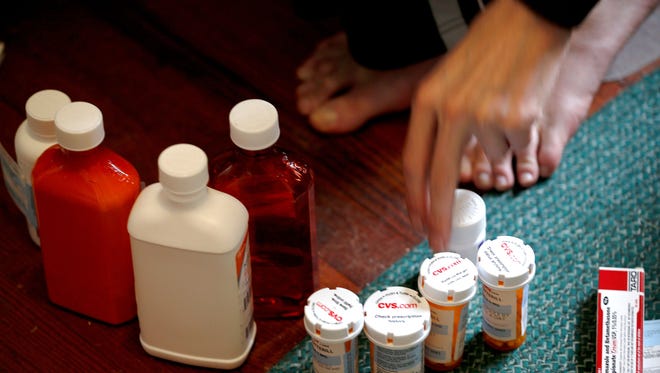Health care advocates say the Trump budget plan would gut Medicaid
Advocates for low income people struggled to find the words to describe the likely effect of the proposed $800 billion in cuts proposed to Medicaid in the Trump administration's budget released Tuesday.

Depending who you ask, it will be devastating or "just awful" to the lowest income Americans, especially children and those with chronic health conditions, mental illness or substance use disorder.
The more than $800 billion in cuts come over 10 years, and assumes the American Health Care Act will be enacted as passed by the House. That legislation turns Medicaid into a block grant or per capita program for states, which inevitably means benefits are reduced, people lose coverage or both. It also phases out the federal money for the expansion of Medicaid that was in the Affordable Care Act (ACA).
It's highly unlikely, however, that the cuts proposed in the budget will pass Congress. Paul Howard, director of health policy at the Manhattan Institute, calls it "DOA as most presidents' budgets are."
The budget does show, he says, that President Trump wants to "double down on Medicaid efficiency."

It will be very difficult to cut Medicaid by so much in the Senate, where about a dozen Republican senators are from states that expanded Medicaid under the ACA and "don't want to lose that," unless the phase out is very gradual, says Howard.
Savings from slashing Medicaid and other health care costs, are among the largest in the proposed budget.
"This budget will devastate Pennsylvanians living in rural communities by decimating Medicaid and cutting vital economic development programs," complained Sen. Bob Casey, D-Penn.
The $800 billion cut would also slash $5.8 billion from Pennsylvania's Children's Health Insurance Program (CHIP) program in Pennsylvania over 10 years, Casey noted.
Any savings from entitlement programs will lead to higher costs in other areas, says Dennis Hobb, executive director of the Washington-based McClendon Center, which offers mental health services.

"I don't think we want to see more people going to jail, in the hospitals and in the streets," says Hobb. "If Medicaid is slashed like it's been proposed, so many people won't be able to get any care. They're much more likely to re-offend."
About 85% of the McClendon Center's clients are on Medicaid. Up to 25% have been incarcerated and about a third don't have a place to live.
In fact, one of the center's biggest areas of business is working with Medicaid managed care companies when their clients are admitted to the hospital. A two-year McClendon Center program works with all the D.C. hospitals when the companies' clients are admitted with psychiatric issues. The patients are enrolled in programs that include trauma recovery counseling.
The hospital readmission rate is only 1% for regular long-term clients, says Hobb. He calls the proposed cuts "just awful."

Daniel Blum, CEO of Phelps Hospital in Sleepy Hollow, N.Y., says dramatic Medicaid cuts "widen the gap between the “haves” and “have nots” in this country, worsen the health problems already plaguing millions of Americans, and continue to drive up the cost of caring for them.."
Blum isn't "adverse to change," and says health reform is needed. But he worries the ripple effect of such huge cuts would affect his state's budget, causing a "cascade of events that could lead to economic austerity through unintended consequences."
More than 130 million Americans have one or more chronic medical conditions, accounting for about 86% of the more than $3 trillion spent on health care in the United States, according to federal studies.
"Limiting access to care will only exacerbate this nation’s public-health crisis," says Blum.
In Springdale, Ohio, Richard Cotterill says his family would be in crisis if he hadn't been able to get on Medicaid coverage after he aged off his parents insurance when he was 26 and in recovery from cancer.
“Without this health insurance, my parents and I would probably be in massive debt, or I would be dead,” Cotterill said. “Some of the medicine I would need, if I did not have this health insurance, would cost thousands of dollars. And we just don’t have that kind of money.”
While on his parents' insurance, Cotterill went through three bone-marrow biopsies, two six-month courses of chemotherapy, one round of radiation, two bone-marrow transplants, and says, "I still consider myself fortunate.”
Read more:
GOP's 'Obamacare' replacement would put state in control of Medicaid eligibility
Obamacare replacement threatens kids' health coverage
Trump budget cuts safety net programs, hitting states that voted for him
Once on Medicaid, he developed a condition called graft versus host disease, which can occur after transplanted cells attack the recipient’s body.
A stomach port was installed so he could feed himself 12 pints of unflavored liquid nutrition every day. The former massage therapist isn’t well enough to get a job, but some days, he can unfold his massage chair and work on his mother’s shoulders.
Medicaid pays for his 10 prescription medications that he takes every day, including a liquid steroid, an anti-fungal agent and an anti-viral drug. He has regular endoscopy so that the tissue-rejection disorder doesn’t close his throat.
Cotterill said that any reform that shrinks Medicaid would likely kick him out.
“I try not to worry about things unless I can do something about it," he says. "But I’ve had enough challenges. I don’t need any more right now.”
Contributing: Rick Lee at the York Daily Record.